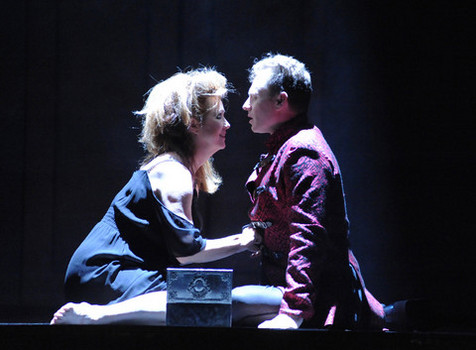No Glass ceiling for American opera; Chicago Opera Theater opens new era with “Usher”

Suzan Hanson and Ryan MacPherson in “The Fall of the House of Usher,” which opens Saturday at Chicago Opera Theater.
Quick, which Chicago opera company is opening a three-year survey of American works with a local premiere by Philip Glass; has commissioned a new opera by an American composer to be unveiled in 2014; and is looking to expand its season as quickly as possible—not with Rodgers and Hammerstein musicals but by actually presenting more operas, with an emphasis on the contemporary and experimental.
Imagine that.
Chicago Opera Theater may not have the glitz, resources and budget of the city’s venerable larger company several blocks to the west. But—with Lyric Opera looking increasingly like a company that is slipping its artistic moorings—under the edgy visionary direction of new chief Andreas Mitisek, Chicago’s scrappy alternative company could soon become the hottest opera ticket in town.
COT opens its first season planned by the Austrian conductor-administrator Saturday night with the Chicago premiere of Philip Glass’s The Fall of the House of Usher at the Harris Theater.
That in itself is significant. It’s been 13 years since the last Glass opera was heard in Chicago (COT’s production of Akhnaten in 2000). And Lyric Opera has not mounted a Glass work in 26 years since Satyagraha in 1987.
Sitting in his spartan, unfurnished office at the company’s new Lake Street quarters—the same building as before but in a smaller space with cheaper rent—Mitisek seems unfazed by any thoughts of pressure as his first performance approaches.

Andreas Mitisek
While giving credit to Brian Dickie, his popular predecessor at COT, for his vision and putting Chicago’s second opera company on the cultural map, Mitisek points out that his stance on repertoire is very different. For instance, he is not interested in committing to doing one Baroque opera every year, one 20th-century work and so on.
“The model of having one slice of each every season is not a model I favor,” said Mitisek. “I don’t discriminate about age of operas. If something is interesting of any time, than I am interested. But it has to fulfill that I can tell a great story with great music.”
For instance in Long Beach Mitisek presented the American premiere of Vivaldi’s long-lost opera Montezuma. “Its interesting when you talk about Philip Glass and Vivaldi there are some similarities. Vivaldi was sort of the Philip Glass of the 17th century.”
Similarly, while Mitisek gives great credit to Chicago’s major house, he draws a distinction between their two missions. “I think the Lyric has its own world, and it does amazing things. There’s a place for everything, right? There’s a time when you want to go to the Lyric and there’s a time when you want to go to COT, because you get something else there.”
“People are not going to come to us for Trovatore,” Mitisek added. “I think our well-defined niche is things that are new, rare and unusual.”
Indeed, for Mitisek, the overall theatrical impact of a production is every bit as important as the musical element—maybe more. “This is such a big theater town and I am interested in reaching that theater crowd,” he says firmly. “I am interested in the theatrical aspect of opera with the music. In that sense I might push [the theatrical side] maybe a little more than Brian.”
Hence, Philip Glass to lead off his first season as COT’s new leader. For Mitisek, the popularity, success and relatively low profile of Glass’s music locally is what made one of his lesser known chamber operas so appealing for Mitisek’s first production.
“Well, first Philip Glass is one of our most prominent American composers,” says Mitisek. “In almost every genre from film music to opera. With his 75th birthday last year, I think it’s important that he has a presence in Chicago. And with a work from a novel by another iconic American figure, Edgar Allan Poe, we have the combination of both. This is the Chicago premiere and it’s actually stunning to me that it hasn’t been done here before.”
Composed in 1987, The Fall of the House of Usher was a joint commission by American Repertory Theatre (ART) in Cambridge, Massachusetts and Kentucky Opera. It was premiered at ART in 1988 and more recently staged at Nashville Opera in 2009.
“It’s a fabulous piece and really is Philip Glass at his best by focusing the tension that happens in this story through the music,” said the conductor. “It’s amazing how it really draws you in.”
“The music is like with Poe,” he adds. “You have to suspend your expectations because you don’t know where it’s taking you. So you’re constantly held in this space and that’s just like with Glass’s music.”
The current staging—like several upcoming COT shows—is a co-production with Mitisek’s other company, Long Beach Opera, where it debuted last month. The economies of scale achieved by having the two companies join forces was clearly an attractive element to the COT board members who hired Mitisek.
“Artistically and economically it makes a lot of sense,” said Mitisek. “When we can combine our budgets for sets, it comes out much better for both companies. It’s a big savings for COT.
“It’s also much better and more interesting for a director and singers to be able to work on a piece longer—and know it is being seen and performed for more people in two places rather than one.”
Despite inhabiting two fiscally antagonistic roles, as both general director and artistic director of COT, Mitisek says he actually enjoys finding new and creative ways to save the company money without affecting the quality of what is seen on stage.
“I look at it artistically and administratively,” says Mitisek. “I’ve been balancing those things now for ten years [in Long Beach]: what you want to see on stage versus how can you pay for it.”
One example is the expensive warehouse COT was previously using, which Mitisek quickly jettisoned. “We got rid of that. We found some storage space donated generously by a supporter, which saves us about $20,000.”
“You have to look at little things as well as big things to save money,” he said. “It’s about reevaluating every expenditure and finding ways to be both efficient and imaginative in the way we put on these productions. Doing a coproduction with Long Beach Opera saves COT about $100,000. It is our obligation to be good stewards of the money that people give to us to produce.”
Mitisek says that the company finished its 2012 season in the black and its annual books are balanced. Some outstanding debt remains, however, though Mitisek says they have reduced COT’s lingering $1 million debt by over a third to $600,000.
With COT’s April show, Piazzolla’s Maria de Buenos Aires, Mitisek’s hand will be even more apparent as conductor, production designer and stage director, the triple-duty he did for the same show in Long Beach. (“You’re getting a big share of me this year,” he laughs.) Verdi’s Giovanna d’Arco (Joan of Arc) closes the season in September—a holdover from the Dickie era’s poll-the-audience project—and will be directed by David Schweizer.
Future plans include expanding the COT season to four operas next year and, hopefully, five in 2015, as well as presenting at least one show a year off site in an unusual location. Expect a contemporary opera in an industrial venue late this fall. “It will be a modern piece in a very interesting environment.”
Clearly there is a buzz and renewed sense of excitement about COT, even before the curtain goes up on the first show of the new era. Mitisek says COT’s burgeoning subscriber rolls show that Chicago audiences are looking for repertoire beyond what Lyric is presenting during the “regular” opera season.
“We’ve already exceeded last year’s subscriber numbers by this point,” he said. “Last year we had 1,666. And this year we have already over 1,700. And we’ve gone from 192 new subscribers to over 600 this year, so they’re either completely new or haven subscribed in two years and are coming back.”
More than the tight fiscal responsibility, most heartening for many local opera fans is the strong commitment to American opera. Shortly after Mitisek came aboard officially to succeed Dickie as COT chief, the company was awarded a $500,000 grant by the Mellon Foundation for a three-year project of presenting American works. That project kicks off with the Glass this season and will continue with a commissioned world premiere by an American composer to be unveiled next year.
Like his compatriot David Danzmayr, the new music director of the Illinois Philharmonic Orchestra who plans to do an American work on every program next season, Mitisek is a committed advocate, determined to restore American opera to Chicago stages, where it has been sadly missing in action over the past several years.
“Even though I’m Austrian, I’m very committed to American music,” he says. “Maybe sometimes you need to have that outside sensibility.”
“I think opera has to take us somewhere we haven’t been,” says Mitisek. “There’s a lot of very important American opera composer voices who have a lot to say to us. Music gets us so much closer to a story that maybe we don’t want to experience. But it can also get us closer to stories that we should experience.
“And I think with American composers’ music coming out of this culture, it’s important to show that. We’re familiar with some of these sounds but the composers can reimagine it and turn it around, so that something we know in a certain way suddenly shifts to something else.
“There are a lot of amazing works out there and I wish our season was as large as the Lyric so we could have eight different operas. I have a big list of operas I want to do here. I can’t wait!”
Chicago Opera Theater presents Philip Glass’s The Fall of the House of Usher 7:30 p.m. Saturday, 3 p.m. Sunday and 7:30 p.m. February 27th and March 1. chicagooperatheater.org; 312-704-8414.